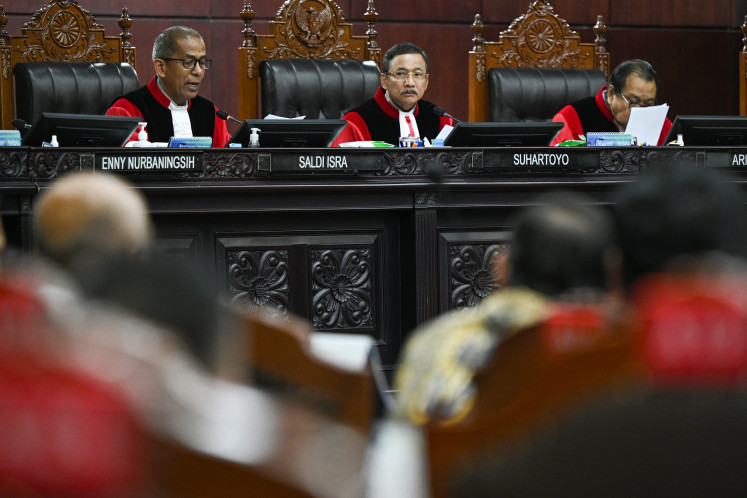Popular Reads
Top Results
Can't find what you're looking for?
View all search resultsPopular Reads
Top Results
Can't find what you're looking for?
View all search resultsAre we liberalizing our bureaucracy?
In the name of bureaucratic reform, the 2014 Law on the State Civil Apparatus enables non-civil servants to vie for top-echelon posts, a departure from the old system that reserved the positions exclusively for career bureaucrats.
Change text size
Gift Premium Articles
to Anyone
 Former Energy and Mineral Resources Minister Arcandra Tahar enters his official car after attending a meeting at the office of Coordinating Maritime Affairs Ministry on August 9. President Joko "Jokowi" Widodo had dismissed Arcandra on August 15 over the controversy of his dual citizenship. (Antara/Akbar Nugroho Gumay)
Former Energy and Mineral Resources Minister Arcandra Tahar enters his official car after attending a meeting at the office of Coordinating Maritime Affairs Ministry on August 9. President Joko "Jokowi" Widodo had dismissed Arcandra on August 15 over the controversy of his dual citizenship. (Antara/Akbar Nugroho Gumay)
T
he controversy over dual citizenship that has forced President Joko “Jokowi” Widodo to dismiss Arcandra Tahar as the energy and mineral resources minister is a clear lesson that the appointment of public officials, including in the top echelon of the bureaucracy, requires a thorough and careful examination.
In the name of bureaucratic reform, the 2014 Law on the State Civil Apparatus enables non-civil servants to vie for top-echelon posts, a departure from the old system that reserved the positions exclusively for career bureaucrats.
The law divides the civil apparatus into civil servants and non-civil servants, who are called government employees with work agreements (P3K). Under the law, non-civil servants can contest first-echelon posts of director general, secretary general, inspector general, agency head, deputy and special advisor to the minister in all ministries/institutions as well as heads of non-ministerial government institutions.
Unfortunately, there is no derivative regulation of the law that sets a standard for non-civil servants aspiring for the top-echelon posts. The criteria are unilaterally determined by the selection committee appointed by the minister or chairman of the institutions, which may differ from one ministry/institution to another. In general, however, the requirements for non-civil servants tend to be much lighter than those for civil servants.
According to the law, non-civil servants eying first-echelon posts do not need to go through a career path as civil servants must. There is no age limit for non-civil servants to join the selection process either.
On the contrary, career civil servants have to follow a decades-long career path, as well as education and training to be eligible for a top position in the bureaucracy. The law, one of the legacies of the Susilo Bambang Yudhoyono administration, has changed the face of our bureaucracy today. A state agency has gone so far as recruiting non-civil servants to fill all the top-echelon posts.
Those are symptoms of creeping liberalization in our bureaucracy. This liberalization has disrupted career patterns in the bureaucracy and will potentially demoralize performing civil servants.
Many agree that this liberalization arises due to the long-held stigma of civil servants as sluggish, unresponsive and corrupt. But it cannot be denied that bureaucratic reform has improved the discipline and professionalism of civil servants and weeded out underachieving human resources.
Thanks to the merit system adopted in the bureaucratic reform, many civil servants pursue master’s and doctorate degrees from major universities both within and outside the country. Management expert Rhenald Kasali acknowledges in his book Recode DNA that many civil servants today show intelligence and skills that are above the average.
In fact there are outstanding civil servants who have secured national and international recognition as the fruit of bureaucratic reform.
Another credit point of career civil servants is their track record, which is easily traced thanks to the monitoring system and regular assessment. This ensures they have the capacity and experience that their organization will need when looking for the right persons for top-echelon jobs.
What about the non-civil servants? How to prove their loyalty to the Republic and measure their track record? How can we be convinced about their integrity?
Implementation of the State Civil Apparatus Law may compromise the interests of certain parties and oligarchs who want to influence ministries/institutions through their non-civil servant arms for material or political gains. It can happen if the non-civil servants hold key posts in the bureaucracy.
Indeed top-echelon level is strategic in policy formulation. It therefore is imperative for the government to draft a government regulation to implement the State Civil Apparatus Law as a guideline for placement of non-civil servants in the bureaucracy. Such a regulation would also serve to ensure the non-civil servants nominated for the top-echelon posts had the clean and clear track records, experience, capacity and competency required by certain ministries/institutions.
The drafting process of the regulation should involve institutions known for their competence, such as the Defense Ministry, Foreign Ministry, Home Ministry, Administrative and Bureaucratic Reform Ministry, State Intelligence Agency (BIN) and State Cryptology Agency (LSN).
We certainly do not want the state to be managed by amateurs who lack a sense of responsibility and misuse their authority as payback for certain political and economic interests.
***
The writer, who holds a master’s degree in management, heads the international non-governmental cooperation sub-directorate at the Creative Economy Agency. The views expressed are his own.
---------------
We are looking for information, opinions, and in-depth analysis from experts or scholars in a variety of fields. We choose articles based on facts or opinions about general news, as well as quality analysis and commentary about Indonesia or international events. Send your piece to community@jakpost.com. For more information click here.









